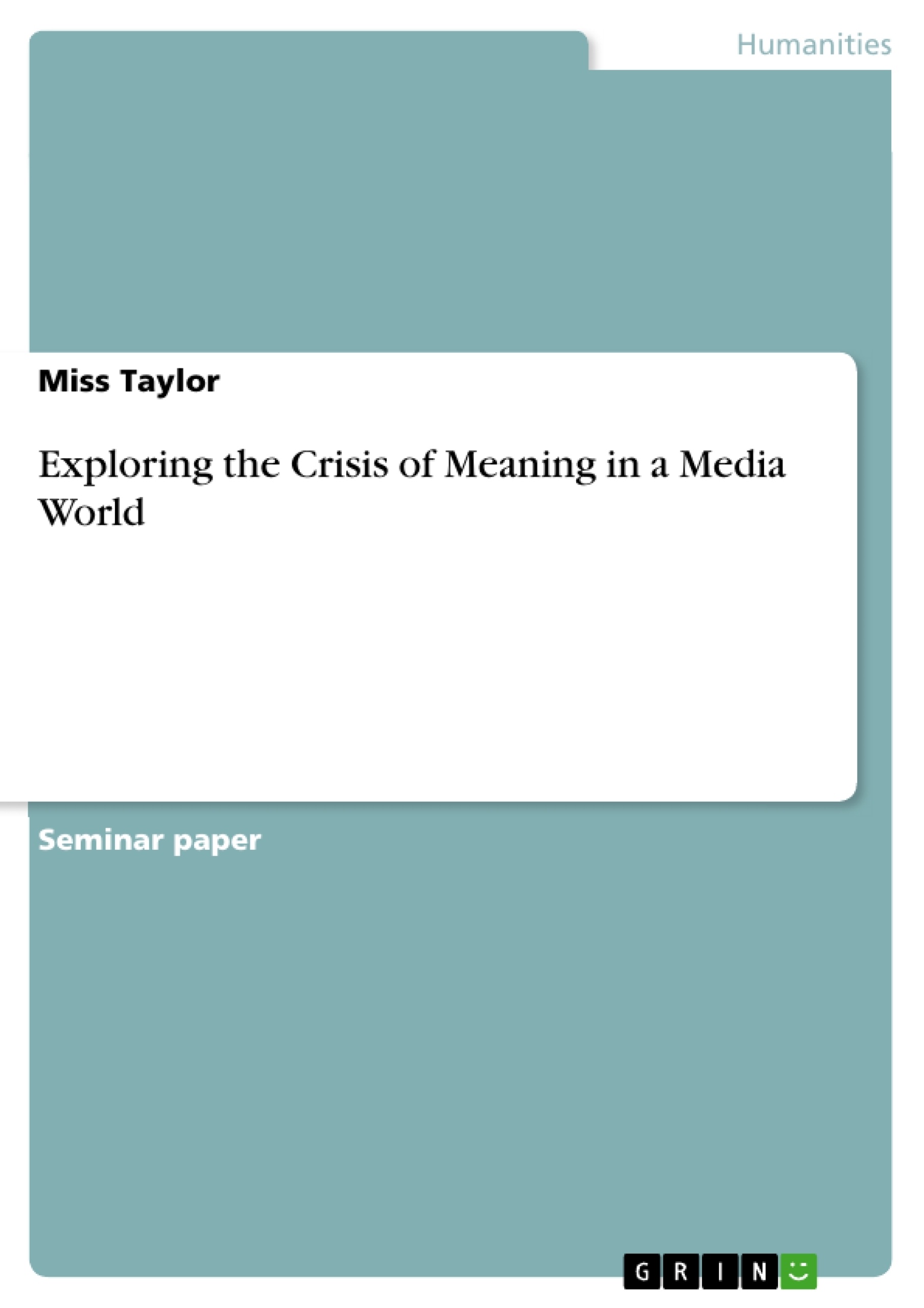The digital age has profoundly reshaped societal norms, influencing how individuals think, live, and interact with media. In Fahrenheit 451, Ray Bradbury presents a dystopian world where the overindulgence in shallow media and the suppression of intellectual freedom leads to a crisis of meaning. This paper explores parallels between Bradbury's narrative and contemporary society, focusing on the adverse effects of excessive media consumption, particularly its role in fostering unhappiness, social isolation, and the erosion of critical thinking. Through the lens of Guy Montag’s journey from disillusionment to enlightenment, the study examines themes of hedonistic versus eudaimonic well-being, societal illiteracy, and the potential for media literacy to serve as a counterbalance. By linking Montag’s awakening with modern issues such as social media addiction and information overload, the paper argues for the urgent need for critical engagement with media to foster meaningful relationships and personal growth. The conclusion highlights actionable strategies for individuals to navigate the media-saturated landscape while drawing inspiration from Bradbury's metaphor of the phoenix, symbolizing renewal and hope for a more introspective and critically aware society. This discussion underscores the timeliness of Bradbury's warnings and their relevance in guiding today's media practices toward a more thoughtful future.
Inhaltsverzeichnis (Table of Contents)
- Abstract
- Introduction
- The Effect of Unhappiness
- The Cause of Illiteracy
- Conclusion
Zielsetzung und Themenschwerpunkte (Objectives and Key Themes)
This paper explores the parallels between Ray Bradbury's Fahrenheit 451 and contemporary society, focusing on the negative impacts of excessive media consumption. It examines how over-reliance on shallow media contributes to unhappiness, social isolation, and a decline in critical thinking. The study uses Guy Montag's journey as a lens to analyze the contrast between hedonistic and eudaimonic well-being.
- The crisis of meaning in a media-saturated world.
- The contrast between hedonistic and eudaimonic happiness.
- The impact of media consumption on critical thinking and social interaction.
- The role of media literacy in fostering personal growth and meaningful relationships.
- The potential for societal renewal through critical engagement with media.
Zusammenfassung der Kapitel (Chapter Summaries)
Introduction: The introduction establishes the central argument: the parallels between the dystopian world of Fahrenheit 451 and contemporary society regarding the crisis of meaning stemming from excessive media consumption. It introduces Guy Montag as the protagonist whose unhappiness arises from a culture that suppresses independent thought and promotes shallow amusement. Montag's dissatisfaction begins with his family life, specifically his wife Millie's obsession with "parlor walls," representing the superficiality of their world that replaces genuine human connection with artificial interaction. Clarisse McClellan's influence further intensifies Montag's questioning of his life and his place in society, highlighting the contrast between superficiality and the desire for deeper connections. The introduction also introduces Montag's antagonists: Captain Beatty, representing a system that discourages critical thought, and Professor Faber, who advocates for knowledge and contemplation as paths to happiness. Finally, Granger's role as a guiding figure who promotes the value of books and intellectual engagement is touched upon.
The Effect of Unhappiness: This section delves into the nature of Montag's unhappiness, contrasting hedonistic and eudaimonic well-being. Clarisse McClellan's influence is key, as her inquisitive nature sharply contrasts with Millie's passive engagement with shallow entertainment. Clarisse's question, "Are you happy?", triggers a profound self-reflection in Montag, revealing the lack of significance in his life and his marriage. Millie's obsession with interactive television screens symbolizes the emotional detachment and shallowness prevalent in their society. The chapter explores how hedonistic pursuits, focused on superficial pleasures, contribute to discontent and emotional detachment, highlighting the contrast with eudaimonic happiness, which emphasizes meaning and purpose.
Schlüsselwörter (Keywords)
Fahrenheit 451, media consumption, crisis of meaning, hedonistic happiness, eudaimonic well-being, critical thinking, social isolation, media literacy, societal illiteracy, dystopia.
Frequently asked questions
What is this document about?
This document is a language preview for an academic paper analyzing themes in Ray Bradbury's Fahrenheit 451 and contemporary society, focusing on the negative impacts of excessive media consumption.
What key themes does the paper explore?
The paper explores themes such as the crisis of meaning in a media-saturated world, the contrast between hedonistic and eudaimonic happiness, the impact of media consumption on critical thinking and social interaction, the role of media literacy, and the potential for societal renewal through critical engagement with media.
What is the central argument of the paper?
The central argument is that there are parallels between the dystopian world of Fahrenheit 451 and contemporary society, particularly regarding the crisis of meaning stemming from excessive media consumption.
Who is Guy Montag and what role does he play in the paper?
Guy Montag is the protagonist of Fahrenheit 451. The paper uses his journey as a lens to analyze the contrast between hedonistic and eudaimonic well-being, highlighting his dissatisfaction with a culture that suppresses independent thought and promotes shallow amusement.
Who are some of the other key characters mentioned in the summary and what do they represent?
Key characters mentioned include:
- Millie Montag: Represents the superficiality and emotional detachment prevalent in the society through her obsession with "parlor walls."
- Clarisse McClellan: Represents inquisitiveness, genuine human connection, and a desire for deeper meaning.
- Captain Beatty: Represents a system that discourages critical thought and promotes conformity.
- Professor Faber: Advocates for knowledge and contemplation as paths to happiness.
- Granger: Promotes the value of books and intellectual engagement.
What is the difference between hedonistic and eudaimonic well-being as discussed in the paper?
Hedonistic well-being focuses on superficial pleasures and immediate gratification, while eudaimonic well-being emphasizes meaning, purpose, and fulfillment derived from meaningful activities and relationships.
What are the keywords associated with this paper?
The keywords are: Fahrenheit 451, media consumption, crisis of meaning, hedonistic happiness, eudaimonic well-being, critical thinking, social isolation, media literacy, societal illiteracy, dystopia.
- Arbeit zitieren
- Miss Taylor (Autor:in), 2024, Exploring the Crisis of Meaning in a Media World, München, GRIN Verlag, https://www.hausarbeiten.de/document/1554461


